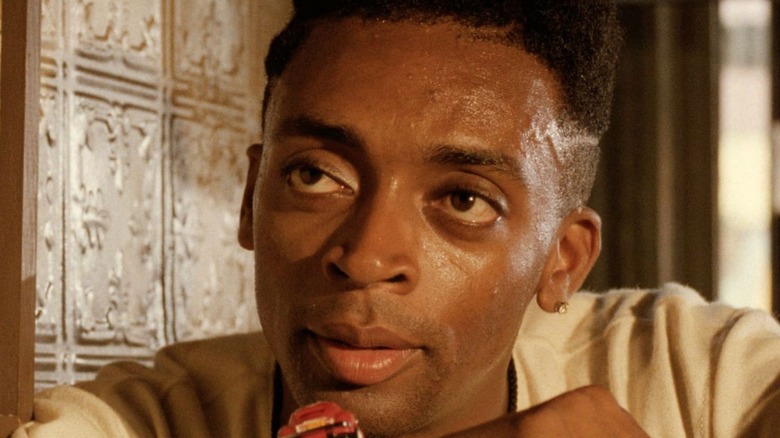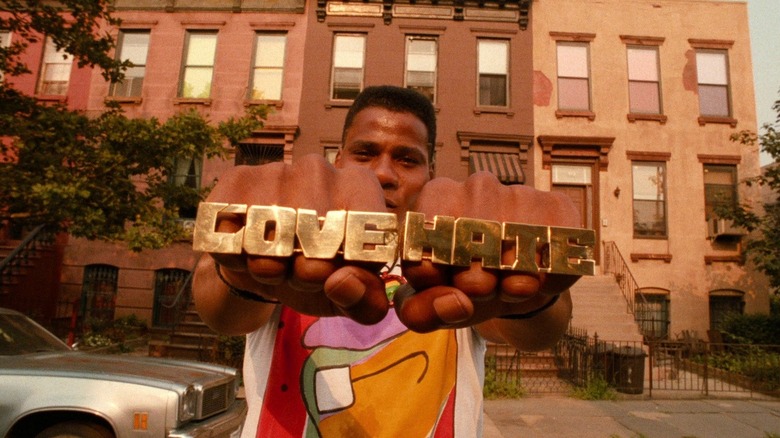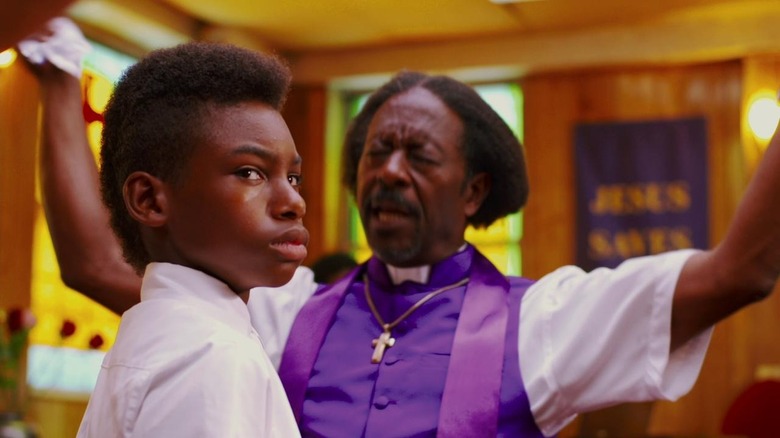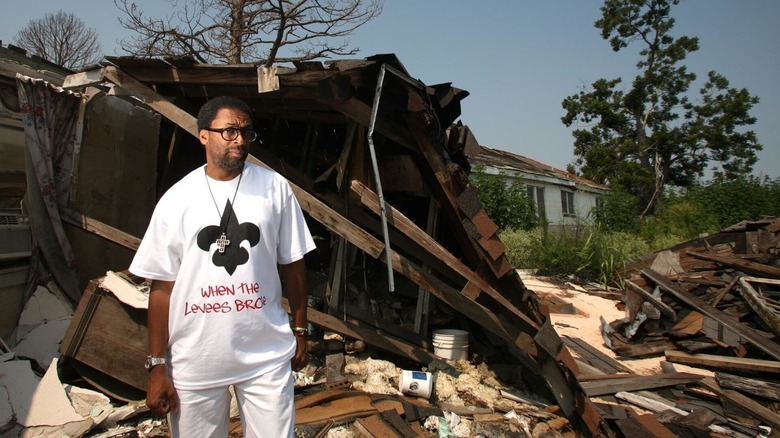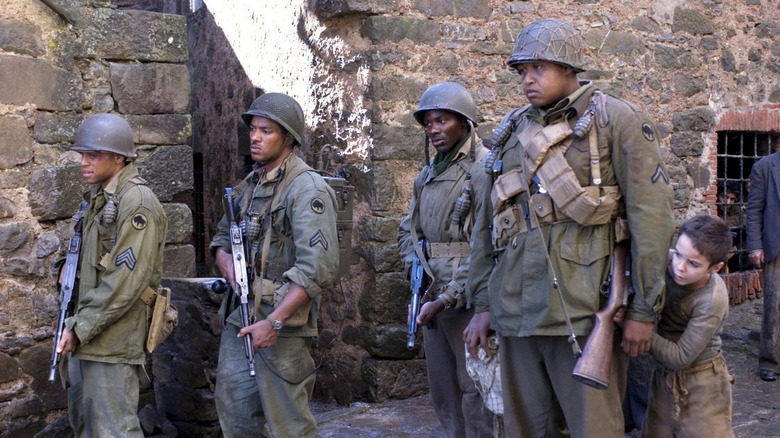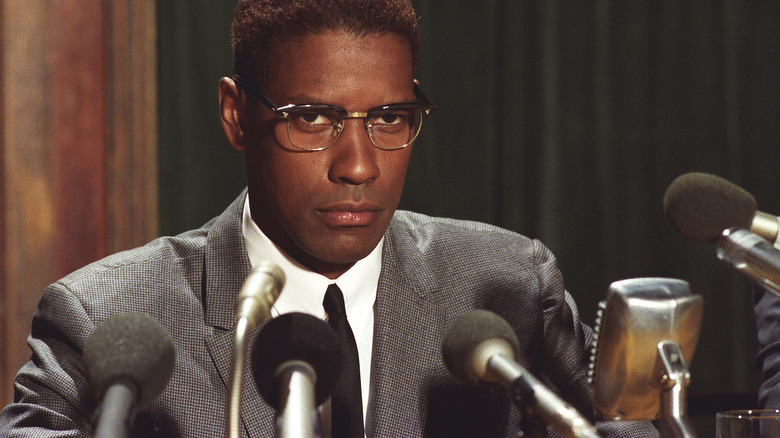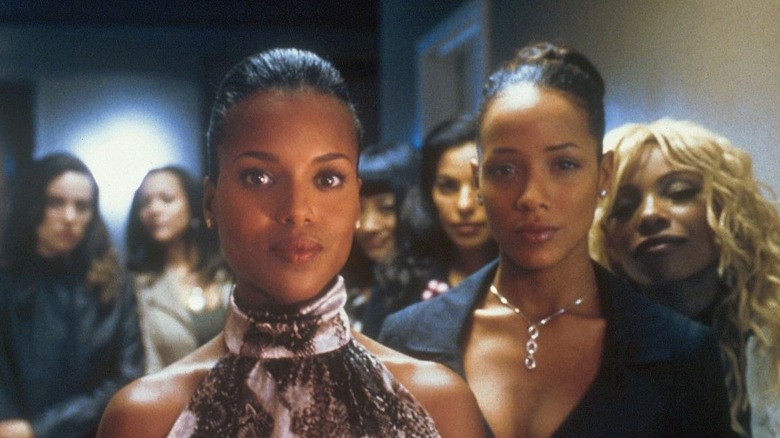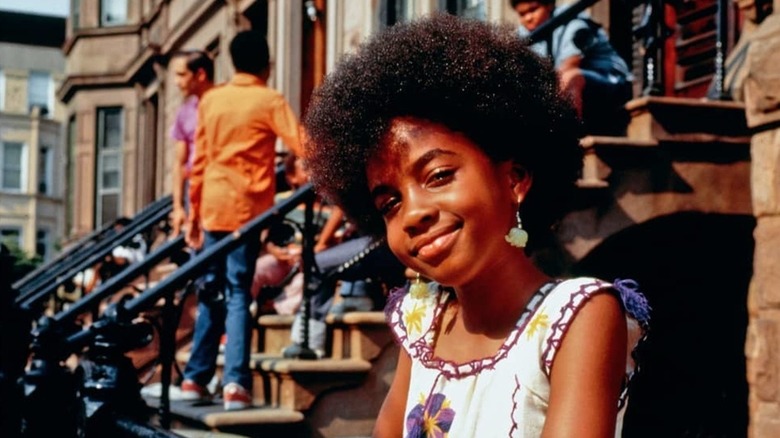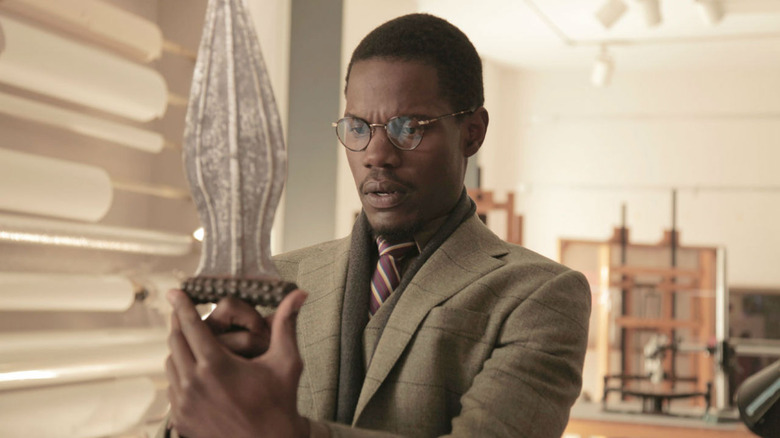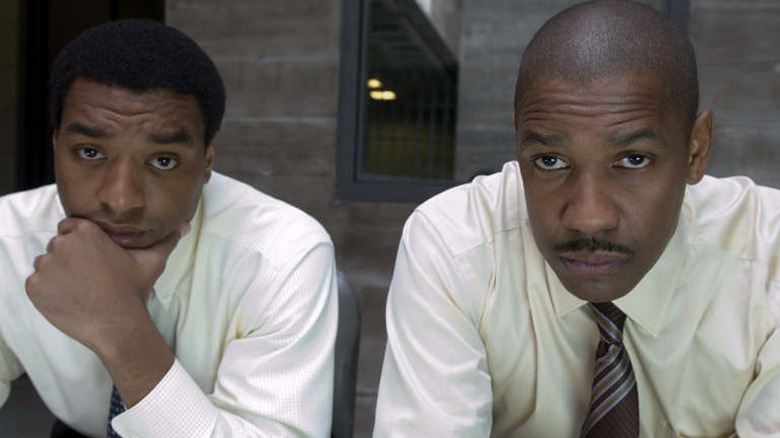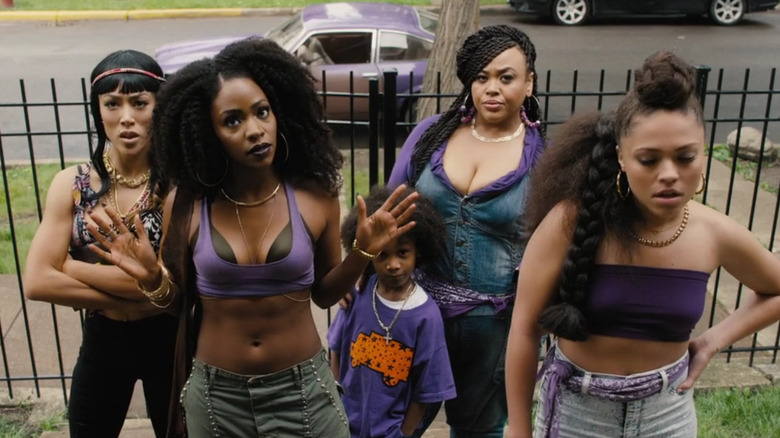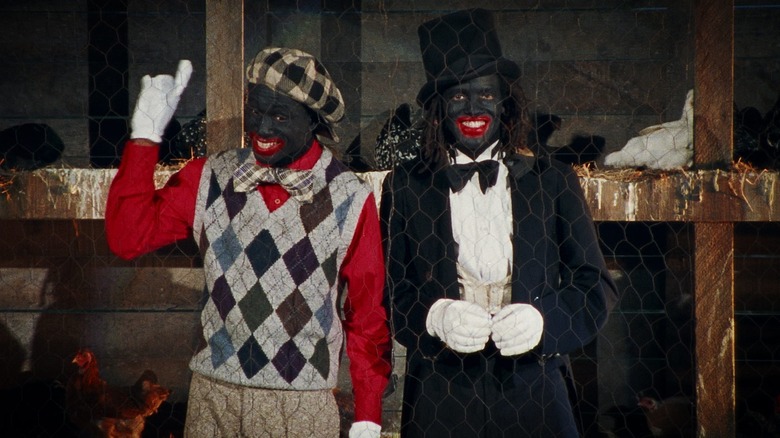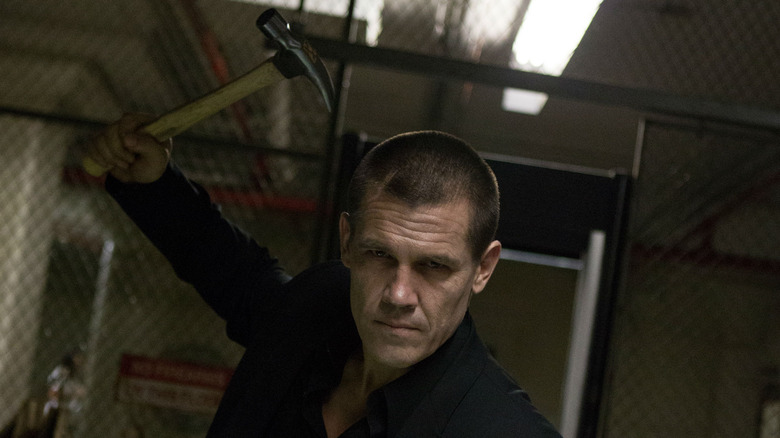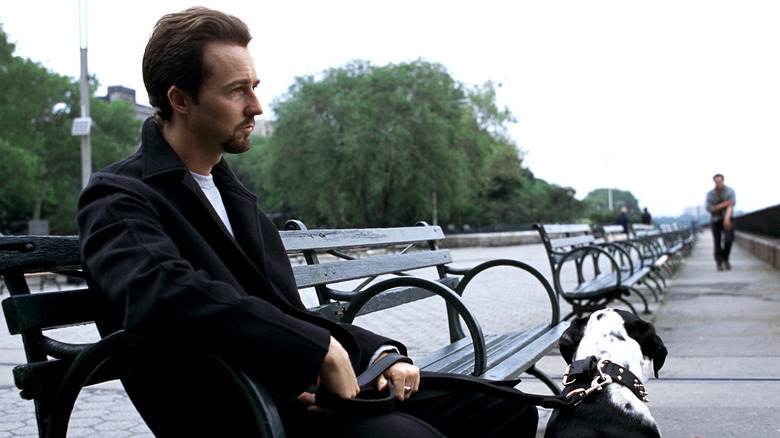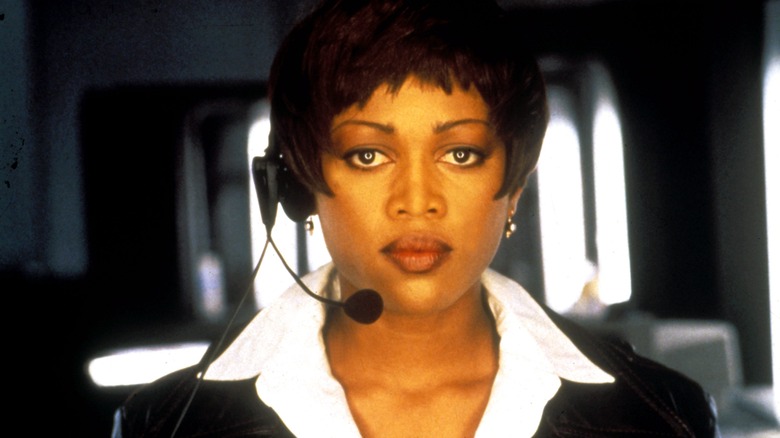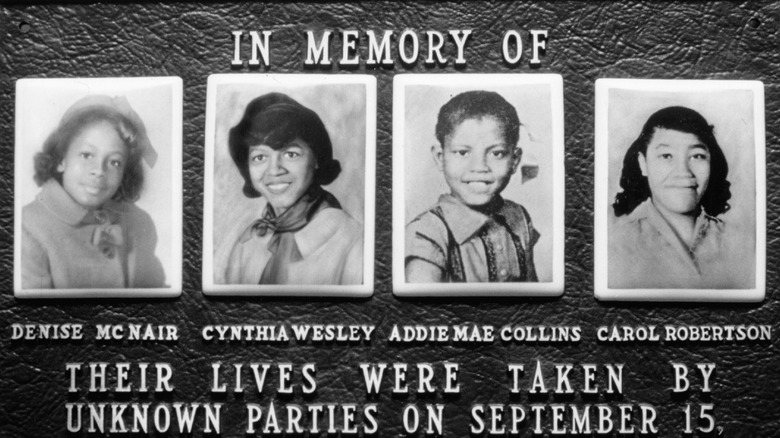The 8 Best And 7 Worst Spike Lee Movies
Spike Lee has been called many things — activist, historian, filmmaker, artisan, American interrogator, and general examiner of the Black condition. However, fighter may be the most familiar of them. Consider fighting as a shorthand for Lee's artistry, but also as a deceptive quality when his battles — on a script, in a Lee joint, in the news, and at a film festival — are just the byproducts of his truth; a Lee don't-give-a-damn sort of truth.
To this day, few can make a cinematic statement like Lee. He's at his most powerful when a message is at the ready — when his examinations exist in America's past and present. It's all in his resume, from recent joints like "Da 5 Bloods," mid-'80s joints like "School Daze" and "She's Gotta Have It," all the way to his masterpiece, "Do The Right Thing." Whether it be a movie or directorial look — the Yankees cap and the thick-rimmed glasses — Lee's presence has been a difference that American cinema continues to need, even as an imperfect one.
With all this in mind, here's a bit of Spike Lee's cinematic oeuvre, for better and worse.
Best: Do the Right Thing
"Do the Right Thing" may have been Spike Lee's third film — it followed "She's Gotta Have It" and "School Daze" — but it flaunts around as if it were his 50th. The lush, expressive style established a skilled signature style in 1989; the use of lighting, offbeat angles, and probing close-ups of stars embodied a Brooklyn-set chorus of hilarity, community, and trauma. It's his magnum opus joint.
Featuring director Lee himself as the protagonist Mookie, a pizza delivery man working at Sal's Famous Pizzeria — the only white-owned establishment in his Bedford-Stuyvesant neighborhood — "Do the Right Thing" takes place during the course of one hot day, both physically and figuratively. Every signifier of Lee's Brooklyn summer minutiae is here: stoop-sitting, blasting fire hydrants, and lawn chair squabbles. With a legendary cast of characters (Danny Aiello, Ossie Davis, Ruby Dee, Giancarlo Esposito, John Turturro, and Rosie Perez to name a few), Lee exposes how quickly this normality can turn tragic when Black bodies, misunderstandings, and police officers intermingle.
America — wait for the understatement — was rocking with a different grade of social awareness in 1989. "Do the Right Thing," after all, was immediately met with resistance by an assortment of critics, with some even going as far as to fault the film for instigating instances of protest and social unrest. What many couldn't appreciate at the time was Lee's fundamental understanding behind the hows and whys behind protest violence — the way his own Blackness informed what would later be considered one of the best and most informed films of all time, before and after George Floyd.
Worst: Red Hook Summer
"Red Hook Summer" is what happens when you blend the energy of "Do the Right Thing" with Lee's low-budget roots. It's hopeful at first, but fizzles under the weight of a far more legendary vibe. It's also hurt by the borrowing of the coming-of-age aesthetic from "Crooklyn," without putting the same effort into anything of substance.
The elevator pitch is run-of-the-mill: Flik Royale (Jules Brown) from Atlanta is sent to live with his preacher grandfather, played by "The Wire" alumni Clarke Peters, where the old school clashes with the new school. And that's mostly "Red Hook Summer." Lee treated this 2012 project like scribbled notes; plot points go from the underdeveloped to the completely shapeless, even as the building of his world seemed sincere. All in all, it's the sort of movie you put on in the background after you've already seen Lee's best work — it's not so bad that it isn't watchable.
Best: When the Levees Broke: A Requiem in Four Acts
One day, when film historians eventually put together the de-facto cinematic curriculum of the Bush Jr.-era, Spike Lee's 2006 documentary "When the Levees Broke" will land on that list. Shot in New Orleans and Miami, the film, which blurs the line between an intimate collaboration and an observation of a tragedy, depicts the before and the after of Hurricane Katrina, and the way human failure fueled a national disaster.
As much as Lee is known as a talker-director, he's stupidly underrated as a listener. This was, of course, a storm that killed 1,800 people and caused more than $125 billion in damages. This was a storm that created heroes with New Orleans area codes and villains with government clearances. Lee's mixture of bluntness and sensitivity to the matter draws those lines clearly through intimate interviews with politicians, public figures, and the victims themselves. Lee pulls no punches, laying the blame at the hands of George Bush, FEMA, and the media for its racist portrayals of a New Orleans in need of help.
Worst: Miracle at St. Anna
This one is pretty tough. It's hard to put down any movie that looks to give Black soldiers the credit they deserved during World War II, but here we are. "Miracle at St. Anna" is best viewed as a miscalculation: too long, too randomly put together, and packed to the brim with far too many underdeveloped characters. The correct calculation would have been to turn this into a miniseries — think "Band of Brothers" — that would have given Lee room to breathe. There's an entire plot squeezed between prologues and epilogues about a group of four soldiers (Omar Benson Miller, Derek Luke, Laz Alonso, and Michael Ealy) who get separated from their unit and find themselves behind enemy lines.
Adding to it all was how much the marketing of "Miracle at St. Anna" rode on the minimization of African-American soldiers while rarely tackling the look of that discrimination on American soil in the film itself. To Lee's credit, he course-corrected with a far better war film in "Da 5 Bloods."
Best: Malcolm X
"Malcolm X" is still one of the peak examples of Spike Lee's scorched-earth confrontation with America's racism.
To that point, when most Americans think of the titular civil rights figure, the words moving, uncompromising, and fearless come to mind. Lee never forgets to embody his vision of Malcolm X with these qualities, and Denzel Washington doesn't neglect to personify it all, either. Over a three-hour and 22-minute running time, Lee and Washington managed to beautifully capture Malcolm's gift of gab, his unyielding militancy, and his nuanced transition from a political separatist to a universally respected civil rights icon.
Clearly, the thousands of positive words written about the movie still stand. But "Malcolm X" is a great example of a movie that, in hindsight, should not have happened. Lee reportedly put his own bank roll on the line while seeking the help of wealthy members of the Black community to get the film made. It was only this process, combined with publicized economic support, that convinced Warner Brothers to continue their endorsements of the project, a move we should all be grateful for.
Worst: She Hate Me
There are bad ideas, there are horribly bad ideas, and then there's "She Hate Me," a film so stupidly bad in its out-of-touch-ness — particularly when viewed through a 2021 LGBTQ+ lens — that it's difficult to even acknowledge this as a Spike Lee joint. For one thing, it spawns one of the most unavoidable questions for just about anyone who watches it: What strand of bud was Spike Lee smoking? Because something wrong must have happened here.
To watch this is to be fine with a plot about an unemployed business executive (Anthony Mackie) who agrees to be a physical sperm doner — with nooky and all that — to his ex-girlfriend (Kerry Washington), who is a lesbian, along with her friends. Yikes. It's no wonder that in 2004, Spike Lee received the harshest of criticisms from the lesbian community about the exploitation of their lifestyle and a woeful ignorance around the parental choices they've always had. Lee has often been said to have a blind spot when it comes to his portrayals of Black women, but "She Hate Me" takes that to an almost unwatchable level.
Best: Crooklyn
This 1994 love letter to '70s Brooklyn has all the joyful carnivalesque goodness of a hug from momma —i f that hug felt bittersweet. Lee has been vocal throughout his career about growing up in a pre-gentrified Brooklyn. He was the eldest child of an educator and musician, a dynamic that plays heavily in "Crooklyn."
The truth is, "Crooklyn" is Lee's most heartwarming film thanks to the movie's best single feature, Troy, played by Zelda Harris. Through her youthful eyes, Lee, in collaboration with his siblings Cinqué and Joie Lee, presents a story about the moods of childhood; meditations on race, class, and community withstanding. Yes, there's a bevy of lovable performances from the likes of Delroy Lindo, Alfre Woodard, Martin Lawrence, and Isaiah Washington. Yes, it's one of the better cinematic portrayals of a completely functional Black family. But it's really the coming-of-age focus on a charismatic African-American girl that makes "Crooklyn" a memorable and quintessential Lee joint.
Worst: Da Sweet Blood of Jesus
There are five basic things you need to know to get a sense of the vibe around "Da Sweet Blood of Jesus": one, it's a vampire movie without actual vampires or actual bloodsucking. Two, it's a remake of the 1973 "Ganja and Hess." Three, "Ganja and Hess is a legendary art film that absolutely should not have been remade. Four, evil butler, Rami Malek. 'Nuff said. Five, it's the most bizarre movie Spike Lee has ever directed.
It's clear that Lee respected the material enough to stake high personal bets from the jump. Credit given. Reportedly, the fearless director took his chances with a Kickstarter campaign to fund this love letter to a Black cinema classic. But passion rarely fuels goodness on its own, and Lee, who is often burdened by the expectation of greatness, produced a vision that feels emptier than the source material.
Best: Inside Man
Without a doubt, the greatest movies force audiences to experience them on their own terms. They present questions with style, but refuse to treat us with answers prematurely. Spike being Spike, it wasn't enough to create an ode to crime films that features an elaborate heist and a high-stakes game of cops and robbers. He instead had to pack it in with grays, forcing viewers to constantly question who the good and bad guys truly are. Every legendary actor from Jodie Foster, Clive Owen, Chiwetel Ejiofor, Willem Dafoe, and Christopher Plummer pushes play on those questions. But it's Denzel Washington as the inventive detective Keith Frazier who beautifully steers viewers to the answers.
"Inside Man" remains one of a handful of great Lee projects that combine traditional action thrills with a commentary on wealth in post-9/11 New York City. It's prime Lee, in his natural closeness with prime Washington.
Worst: Chi-Raq
There are a number of things that worked against the 2015 drama-musical "Chi-Raq": "Wild n' Out" host Nick Cannon acting tough, which always feels off; a general misunderstanding of Chicago's south side; the use of sex as a solution to gang violence; the absolute, oh, Spike-ness of this entire movie.
And you know what? It was, and still is, fun, as if this was Lee as his most experimental version of himself. Beyond Cannon, the cast consists of an impressive roster that includes the likes of Ale R. Hibbert, Sonja Sohn, and "WandaVision" favorite Teyonah Parris. Through song and dance, it wants to scream solutions from the mountain tops while basking in a satire that doesn't always support the punchline. But Lee is Lee when he's free to be rough around the edges, and "Chi-Raq" is certainly that: a rough around the edges mess, but a characteristically Lee sort of mess.
Best: Bamboozled
"Bamboozled" can be an all-around offensive movie if you view it the wrong way. Spike Lee understood the heinous historical context surrounding blackface, which is absolutely the point. The premise speaks for itself: A TV producer named Pierre Delacroix (Damon Waynes) seeks to create a show about average, middle-class African-Americans. His ignorant white boss thinks he knows more about the culture than Delacroix and elects for a more stereotypical depiction of Black Americans, because shock value is an evergreen seller. What follows is Delacroix and his horribly-intentioned mission to get fired by upping the ante with "The New Millennium Minstrel Show": dances, songs, stereotypes, and full-on black and red paint.
The reason the digicam-shot "Bamboozled" works best in 2021 is the same reason why it didn't work in the year 2000: It tackles a topic that viewers are finally primed to confront. "Bamboozled" was designed to make audiences feel uncomfortable as it examines the roots of the corporate sellout and the ways that racist media have historically preyed on creators of color.
Worst: Oldboy
Josh Brolin looks cool in a hallway, with a hammer and ruffians ready to be hammered. As long as viewers can accept this remake as nowhere near that of Park Chan-wook's original neo-noir thriller — well, Josh Brolin is cool and has a hammer. It's the origin story of a grimy, rain-sloshed city and a bearded Brolin in a drunken state of mindlessness. He's a jerk, a drunk, and likely deserves a lighter punishment than he receives, waking up only to be imprisoned in a fake hotel room for 20 years.
It's important to note that vengeance was Park's currency in the 2003 original, while bone-breaking violence was its net gain. Every moment of force mattered, and every drop of blood had meaning. Lee's version is a swearing, sex, action-filled karaoke rendition. It doesn't capture the slow build-up nor the stylized character building rocked by the original. It's uninspired for the same reasons that Hollywood remakes often feel uninspired. It's just routine.
Best: 25th Hour
"25th Hour" is practically defined by a moment — the horrifying image of two falling towers — and a mass of people dealing with the aftermath, both internally and outwardly. As a specifically Lee class of movie, "25th Hour" is still one of the more clever but modest displays of post-9/11 New York.
Starring Edward Norton as Monty Brogan, it tells the story of a man's last day before a prison sentence. Throughout this gloomy drama, which is set primarily in Manhattan, every event seems to take place with the missing World Trade Center as a backdrop. The tragedy doesn't exist directly as a named event. Rather, it's in what's missing during the moments, where two towers once stood tall. To capture 9/11 was to seize a certain nihilism that existed during that time. Director Spike Lee, along with superstars Norton, Rosario Dawson, Philip Seymour Hoffman, and Barry Pepper masterfully started the job. The mending city did the rest.
Worst: Girl 6
The year 1996 featured an odd drama about a comically naive Black woman played by Theresa Randle who is persuaded to become a phone sex operator. The entire movie was written by Suzan-Lori Parks, a Pulitzer Prize-winning playwright, which feels a bit like an oxymoron. Frankly, it's still hard to believe that a Black woman of her caliber wrote this script when the main protagonist doesn't seem all that well-liked or well written.
It's been said in this write-up already, but Spike Lee's reputation for depicting women has never been great. This was, of course, his second film to star a female protagonist after "She's Gotta Have It," and is, unsurprisingly, one of his most critically-condemned movies. It turns out that a case of phone-boning that advances tired conventions around the practices of sex work is worth scrutinizing. Go figure. A few bizarre cameos from the likes of Quentin Tarantino and Madonna don't help this one, either.
Best: 4 Little Girls
"4 Little Girls" is the supreme proof that Spike Lee knows how to push our collective empathetic buttons. In his signature raw fashion, Lee chronicles the 1963 bombing of 16th Street Baptist Church in Birmingham, Alabama. During that event, the KKK-motivated murder was reported to have taken the lives of Carole Robertson (14), Addie Mae Collins (14), Cynthia Wesley (14), and Carol Denise McNair (11).
From first-person accounts of the tragedy to the eventual conviction of the man responsible, "4 Little Girls" is an absolute overpour of trauma, anger, and pain wrapped up in a nightmare. To Lee's artistic credit, it took trust to expose the bigoted misgivings of a city that fueled an absolutely horrific crime. It demanded the confidence of friends and family members who freely shared stories from a darker time. Few other filmmakers could have told this story in this way. It's uniquely connective with America's historical racist past, while binding itself to our very relatable present.
